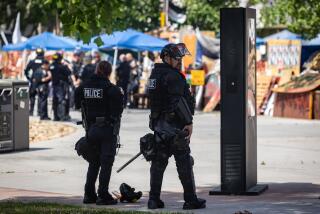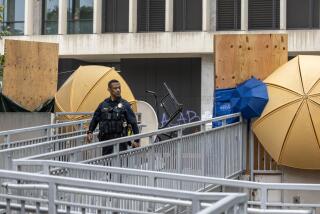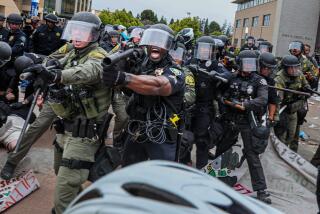Protest Subsides at Urban Farm Site
Nearly 50 farmers and their supporters watched Wednesday as construction workers ate lunch on what was left of the South Central Urban Farm.
After Tuesday’s eviction, in which Los Angeles County sheriff’s deputies forceably removed 17 protesters from the farm and police arrested 27, demonstrations subsided. About 20 protesters, many of whom had been living on the farm, slept in their cars and on nearby sidewalks Tuesday night.
“It looked kind of like skid row,” said Antonio Amercon, 19, who slept in his car, leaving the area just once for a shower Wednesday morning.
Despite a $16-million offer from the Trust for Public Land and the Annenberg Foundation, landowner Ralph Horowitz has said that he would not sell the 14-acre plot to the farmers, partly because of anti-Semitic remarks allegedly made about him by people linked to their cause.
Los Angeles Mayor Antonio Villaraigosa, who tried to negotiate the deal, encouraged the displaced farmers to relocate to a garden at 111th Street and Avalon Boulevard, where many of the original South Central farmers have migrated.
But the remaining farmers, who’ve grown produce at the farm at 41st and Alameda streets since 1992, said they’re holding out hope that Horowitz will change his mind.
“We’re still hopeful that the mayor can step in and close this deal, even if it’s with hurt feelings,” said environmental activist John Quigley, who along with actress Daryl Hannah was plucked from a walnut tree on the farm during the eviction.
Quigley denied that anyone connected to the farmers’ campaign had vilified Horowitz.
“We don’t condone that kind of thing, and we’re very sorry that Mr. Horowitz was subject to any comments like that,” he said.
Lawyers for the farmers will appear in court next month in an effort to overturn the resale of the land to Horowitz, saying it was kept a “secret deal” between him and the city.
The city seized the land from Horowitz through eminent domain in 1986 for a proposed trash incinerator, but activists defeated the project and the land was turned into garden plots for low-income families. Horowitz sued to get the land back 17 years later and won, paying $5 million to reacquire it.
Horowitz did not return telephone calls seeking a comment Wednesday, but has said of the farmers: “If they want to stand on the corner for the next five years, chanting slogans like they did in front of my house, they’re welcome to. But it hasn’t worked.”
More to Read
Sign up for Essential California
The most important California stories and recommendations in your inbox every morning.
You may occasionally receive promotional content from the Los Angeles Times.










